The Last Battle of Rudy Gonzalez
“My grandparents and aunt never accepted Uncle Rudy’s death,” Rudy’s nephew Jerry Gonzalez said. “They hoped, prayed, and believed that one day he was going to come home, walk through their front door. Every day they woke with fresh faith. Every day for decades.
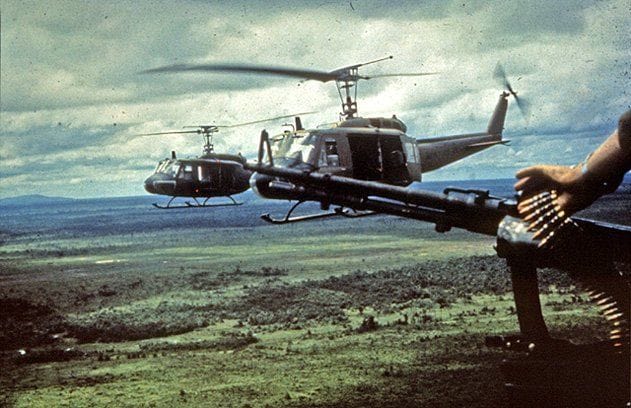
"A soldier doesn’t fight because he hates what is in front of him, he fights because he loves what is behind him." – G.K. Chesterton
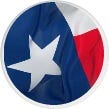
He wanted to help. That was a central part of his character and explained his personal mission. Every one of his peers and family would have understood if he had said, “No, I think I’ve earned these last few days.” They would have never expected that response, though, when the radio call came. No one knew the number of risky missions on which he had flown because each one of them was dangerous, and now, he was just a couple of days from going home. U.S. troops, however, were in a nasty firefight about ten miles south of Danang, in the Quang Nam Province of Vietnam. His helicopter unit, VMO-6, Command Marine Aircraft Group 36, was being called upon to provide air cover for a medevac “dust off” of injured American soldiers. This had been its sole purpose in the war, and his, since deployment to Southeast Asia.
Corporal Rodolfo “Rudy” Gonzalez was only 20 years old when he shipped out from his hometown of Harlingen on the Texas - Mexico border, a small community with palm-lined streets and surrounded by orange and grapefruit orchards. His childhood had taught him the importance of assisting others and he took various jobs as a teenager to help his parents sustain the family. In Vietnam, Rudy consistently accepted dangerous missions to earn the additional combat hazard pay to send home to his parents. He could have kept his original Mission of Service (MOS) assigned to supply for his air group but he asked for the training to get certification as a door gunner, and the chance for additional earnings.
He flew on the UH-1E, “Huey” helicopter, the aircraft that became the iconic symbol of the Vietnam War. Men rode it into battle and, if they were fortunate, back to safety. Rudy’s four-man crew specialized in extraction of the wounded by providing covering fire to the rescue helicopters and medics onboard those ships. Every time the turbines whined and the engine spooled up, the Texan was off to confront a danger that might end his life. The radio plea for rescue assistance on November 14, 1966, was no different than the dozens of others that had dispatched VMO-6 with Rudy and his comrades into combat operations. This time, though, he was just days from flying home, instead of into combat.
Aircraft and crews were suffering debilitating casualties and another medevac chopper had been downed by hostile fire 1/2 mile south of a location known as Hill 55. A medevac bird lowered into the LZ and was able to rescue the wounded pilots, crew, and medics while encountering intense enemy fire. The Huey took several hits from Viet Cong guns but escaped under the protective cover of a VMO-2 gunship’s suppressing fire. Huey choppers and fixed-wing aircraft were later dispatched in an attempt to neutralize the enemy forces but had to withdraw without success after being hit multiple times by VC weapons. Rudy’s VMO-6 crew was sent on a gun run later that day to support the insertion of a maintenance team by a larger UH-34D helicopter. He was strapped to the door, curled over his weapon, manning an M60 machine gun that was firing 7.62 x 51mm NATO rounds.
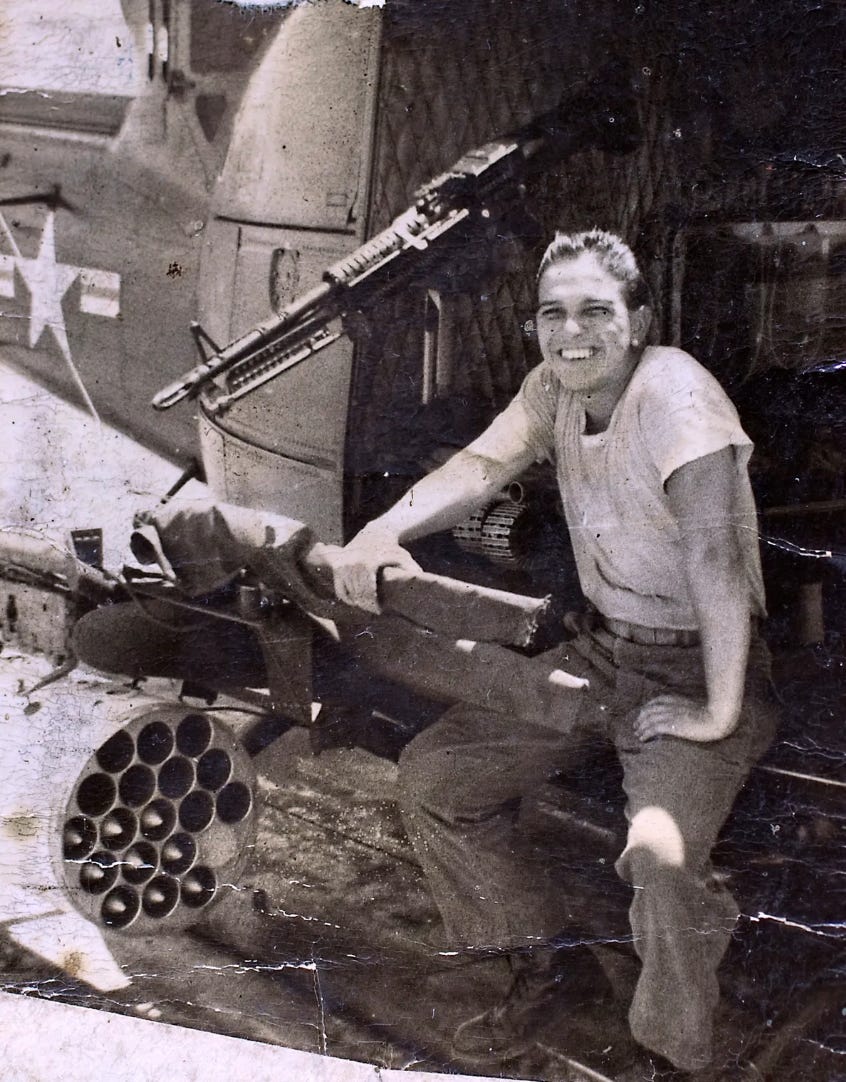
Door gunner was often considered the most dangerous job in the war because they operated from exposed positions on either side of a helicopter flying into combat zones. They were also the central target of enemies on the ground because they were laying fire into their positions. No figures were ever recorded for the exact number of door gunners killed in action but the mortality rate had to be significant. An estimated 11,800 American helicopters were lost in the conflict, which led to the deaths of 5,086 crew members, a number that included pilots, co-pilots, crew chiefs, and door gunners. Another unknown statistic is how many lives were saved by men like Rudy Gonzalez who provided the assault against an enemy that made it possible for the wounded to be rescued and sent home to their families. There are husbands and fathers and sons and brothers who have lived long and fulfilling lives because of the courage of Air Crew Marines like Corporal Rudy Gonzalez.
Another battle was also being fought by the young Marine that November day. He wanted to become a U.S. citizen and was planning on using service to his new country to qualify. A legal resident alien, Rudy had been brought to Texas by his father in 1955 at the age of nine. The entire family, which included five siblings and their parents, Jose Luis and Evelia Cardenas Gonzalez, had immigrated from Monterrey, Mexico after a house fire. Jose Luis had been working and saving money for two years at his job in Harlingen as a master milliner, a hat maker for a prominent local businessman, who sponsored the family’s immigration. They sought no privileges and knew only hard work and financial struggles but the Gonzalez family loved their new country and envisioned opportunities.
As he came of age, Rudy saw his chance in the military. G.I. Bill benefits after his service would make it possible for him to attend college and earn a degree. He also understood that he would achieve eligibility to become a U.S. citizen subsequent to being honorably discharged, which was key to fulfilling his grandest ambitions as a naturalized American. Rudy’s courage in combat was exemplary and as his Huey flew over the jungle on that gun run near Hill 55 outside Danang, he had already been awarded numerous medals like the Vietnam Gallantry Cross Unit Citation; four times he had been presented with the Air Medal for Combat Heroism, the National Defense Service Medal, the Vietnam Service Medal and Combat Ribbon, and, ultimately, the Purple Heart. No one in his Marine Air Combat Crew was aware Rudy Gonzalez was not a U.S. citizen when word came that the pilot of his VMO-6 mission had been shot and his Huey had crashed, killing three of the four crewmen, including the 22-year-old from the Rio Grande Valley of Texas.
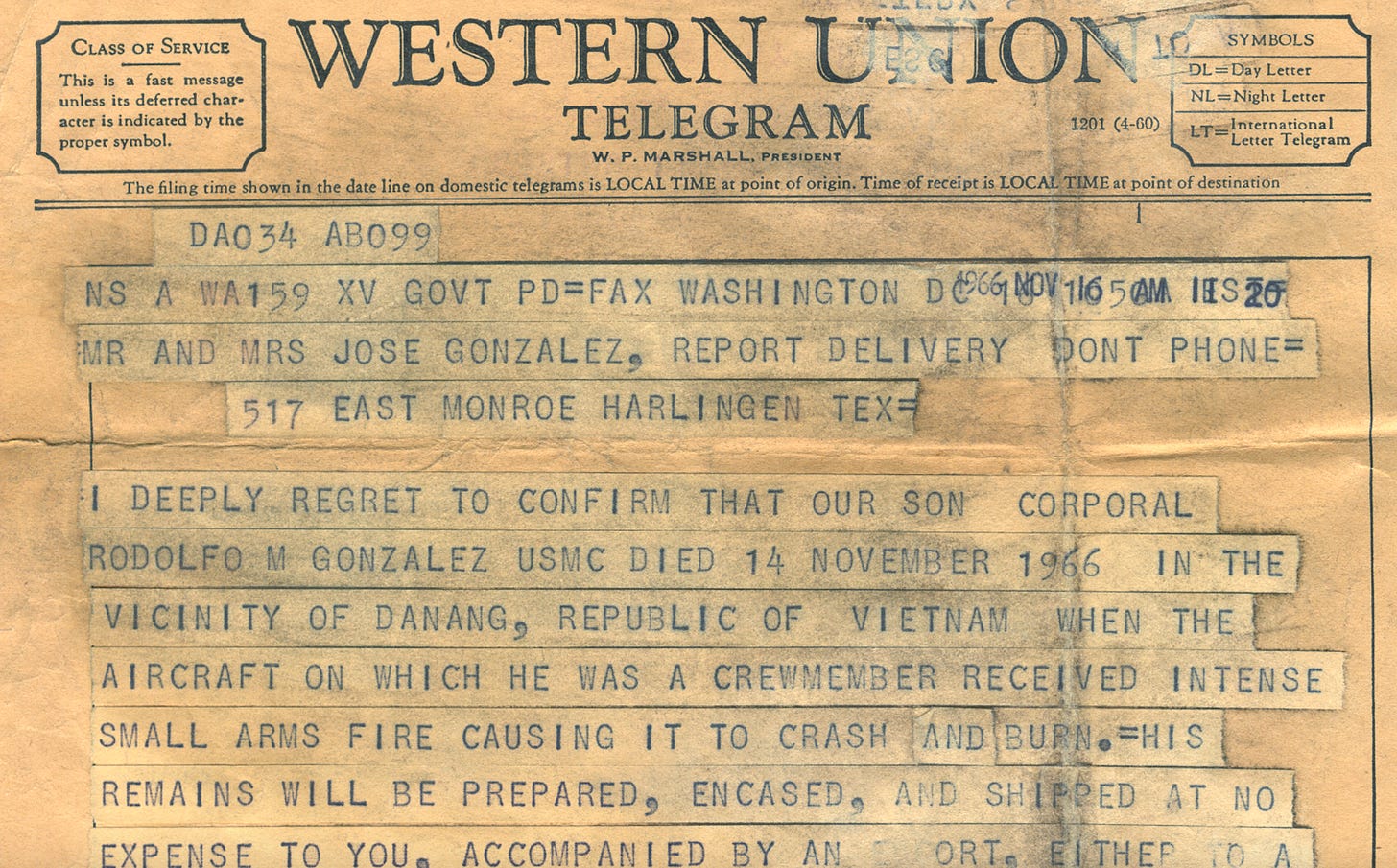
His parents were in a state of disbelief. Because his remaining tour of duty was so short, Rudy’s belongings in his duffle bags had already been shipped home from Vietnam and had arrived at the Gonzalez residence. The bureaucratic telegraph informing the family of his death was impossible to process. How could such a thing be real when his return seemed imminent? Instead, a Marine honor guard delivered his remains in a closed casket, which was lowered into the ground as a bugler blew the mournful sound of taps. Rudy’s parents never saw their son again after his deployment, and, perhaps because of that profound absence, were unable to accept his death, and spent the rest of their lives anticipating his return.
“My grandparents and aunt never accepted Uncle Rudy’s death,” Rudy’s nephew Jerry Gonzalez said. “They hoped, prayed, and believed that one day he was going to come home, walk through their front door. Every day they woke with fresh faith. Every day for decades. Submitting a posthumous application for Uncle Rudy was akin to an unconditional surrender of all hope, to give up their reason to awaken every morning.”
The shock, and his parents’ inability to accept the grim facts, appear to have prevented Rudy Gonzalez from realizing his dream of U.S. citizenship, if only posthumously. The Gonzalez parents had three years to apply with the federal government for their son’s naturalization from the date he was KIA, but they never acted on the required documentation. Rudy’s nephew Jerry remains convinced his grandparents were psychologically unable to accept their son’s death, and may, in fact, have been unaware of any filing deadline.
Unfortunately for the family, there appears to be no effective administrative procedure for application processing after deadlines have expired. The succeeding generations of the Gonzalezes, however, have grown and prospered as their way of honoring Rudy’s sacrifice for the nation he served and loved. A half-century of military service was recorded by his family members even as degrees were earned along with professional status, recognition, and the launch and growth of small businesses. One of Rudy’s namesakes, also a nephew, became a Pulitzer Prize Winning photographer while his brother was an accomplished network television news cameraman for three decades.
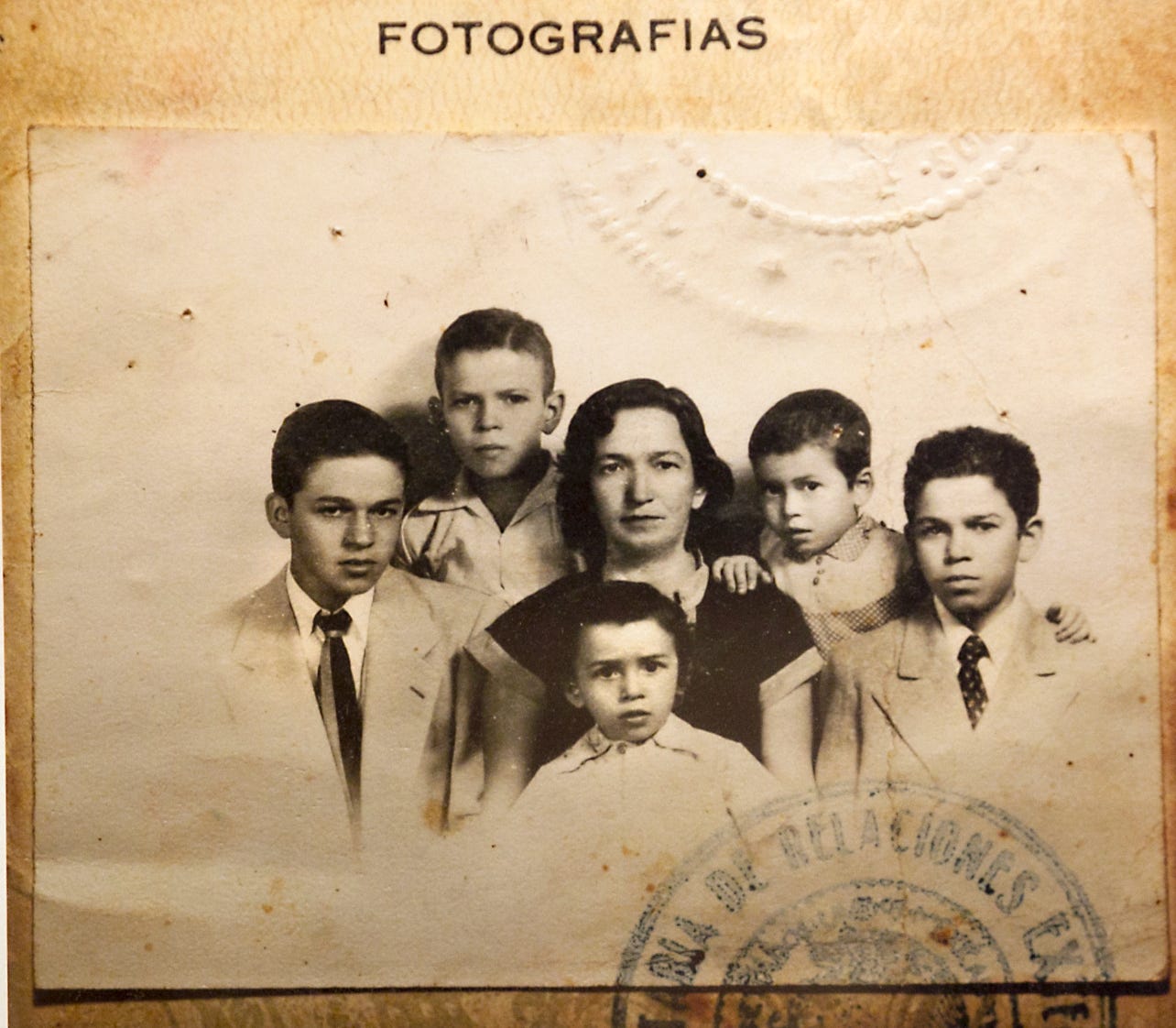
Jerry Gonzalez’s interest in network news was a product of watching TV cameramen record the War in Vietnam. Initially, as a boy, he was searching the broadcast film clips for glimpses of the uncle he had heard was serving in combat. His curiosity led to a career in TV, and years later, he recorded a lengthy interview with his aunt about her fallen brother, which was when he learned of his uncle’s determination to be a U.S. citizen. Jerry and his brother Rudy have been trying for more than a decade to get a member of Congress, the president, or a Department of Defense official, to sign an exemption to grant posthumous citizenship to their late, heroic uncle, but they have had no success. The U.S. government, nonetheless, has a long history dating back to the Civil War of offering expedited citizenship to non-citizens serving in the military; especially during conflicts.
And it is what Rudy Gonzalez, unquestionably, deserves.
“Rudy’s vision for his own future was crystal clear,” Jerry said. “He wanted to go to college, and saw military service as the path to attain this goal, and this was the message he left with his sister, Francis, before shipping off for Saigon. Go to war in order to go to school. It was simple wisdom for an 18-year-old kid.”
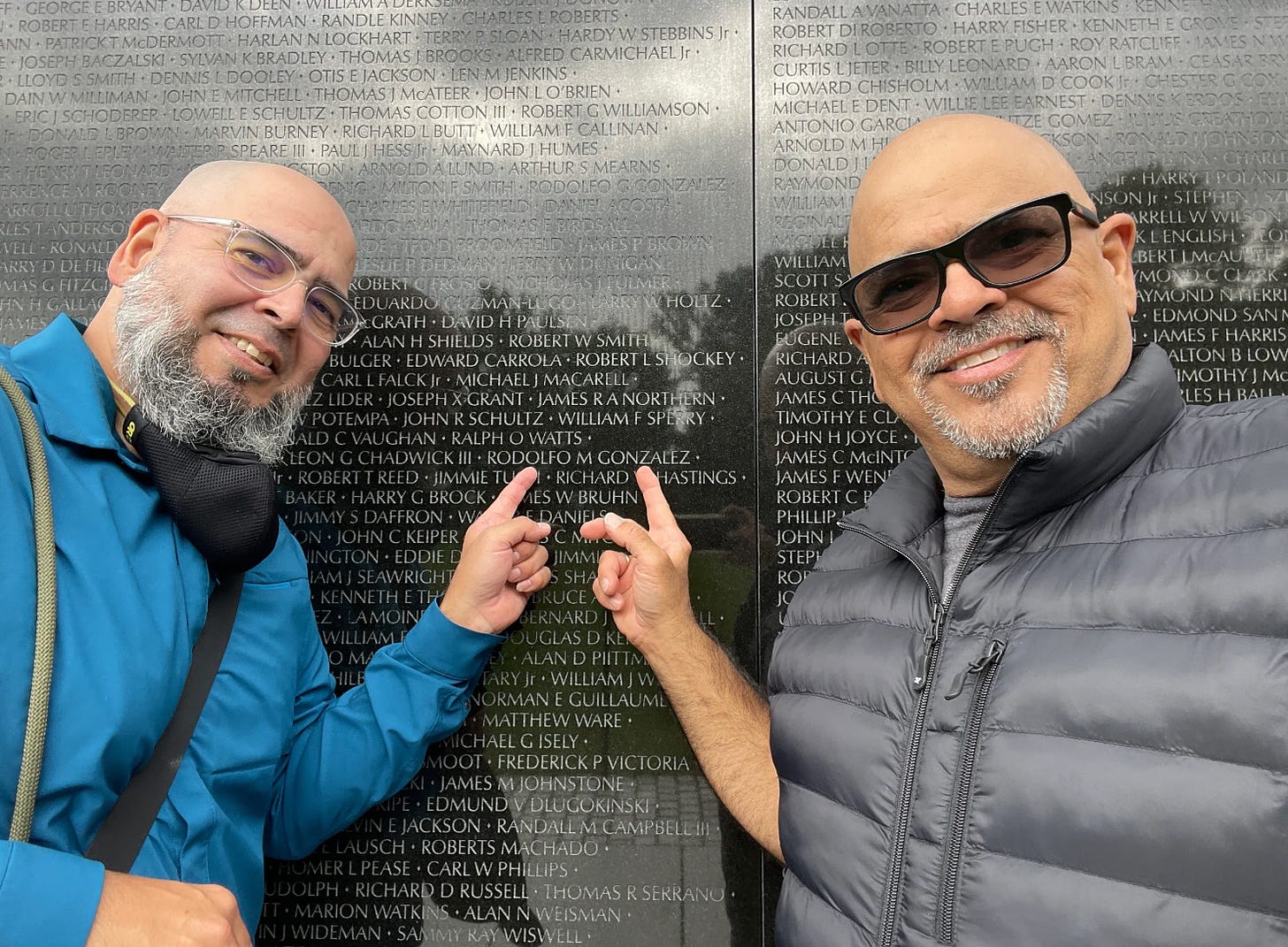
The surviving generations of the Gonzalez family have found the idea of closure to be emotionally evasive. Four of them carry the name Rudy and consider themselves living legacies of a courageous American Marine. They want for him the citizenship he was willing to risk his life to achieve and a denial of this simple honor seems an egregious mistake by the government the young Marine served. Rudy earned many distinctions but becoming an American was his focus. Multiple pleadings and written petitions over the past decade, however, have gone ignored, and the Gonzalez brothers cannot understand why. The American story, of course, is a never-ending saga of immigration, people who came here for opportunity, often at great risk, and helped to build a nation without equal in human history. To deny a member of that country’s military his citizenship after he offered up his life to defend its principles is to dilute the very definition of what it means to be an American.
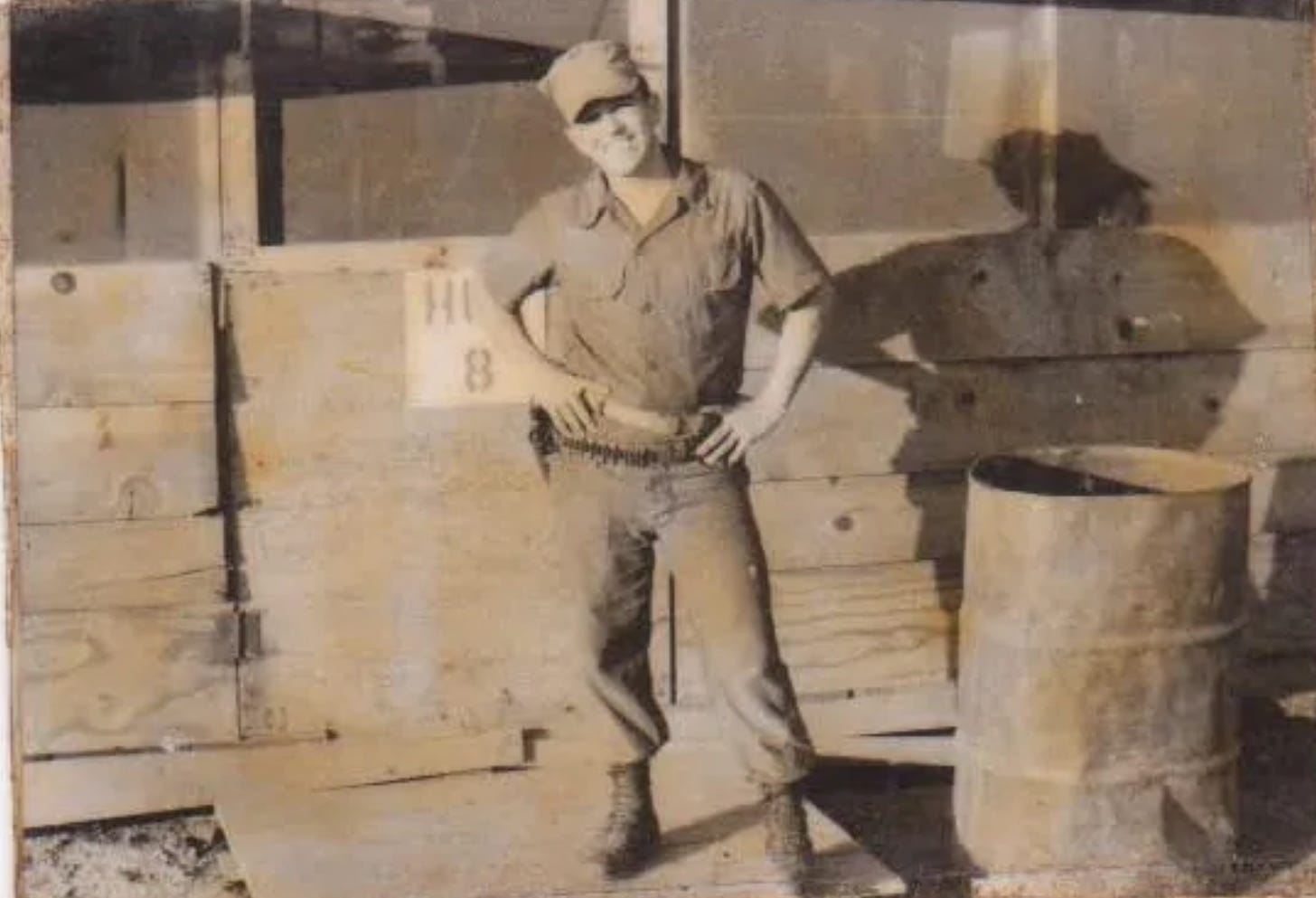
And that’s a loss we all ought to resist with the same courage as Marine Corporal Rudy Gonzalez.